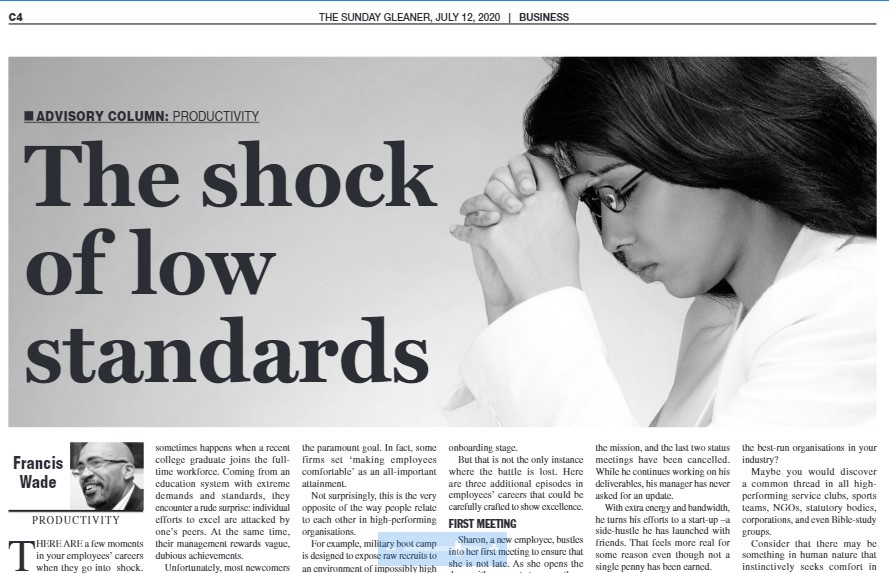We Jamaicans have a difficulty noticing high standards, even when they hit us right in the face. This habit ruins organizations when leaders are the worst culprits.
For example, even our savviest business leaders sometime fall for hucksters who promise miracle “opportunities” which provide instant, effortless riches.
Case in point: I recall intelligent friends trying to convince me that Olint and Cash Plus were legitimate ventures being made available to the common man “by God’s Grace”. These weren‘t isolated con jobs. Apparently, we Jamaicans have a weakness for this kind of argument. We want to achieve success without giving in to the high standard which it demands.
In this context, I can think of two situations in which we are challenged.
1) The first occurs in the moment when we realize that we have just become part of a relationship which calls for higher standards than we have lived by. It’s often a shock. In one situation, a coach I hired threatened (in writing) to double her rates, then triple them, then fire me if I missed another appointment.
In another unrelated case, my late arrival at a meeting was met by a locked door.
As human beings, we don’t react well in these circumstances. “How dare they?” we exclaim, then indignantly try to beat down an “oppressive” standard. We look for weaknesses, loopholes and back doors. If there’s a bly or relationship we can find to free us from the obligation, we’ll use it. At the very least, we get everyone to agree: the upholders (like my coach) are Nazis, no better than Backra.
Paradoxically, we all love the end-result of high standards. Government and Rhodes Scholarships. Winners of Champs and Schools’ Challenge. The manicured lawns of the JCAA. Profits. The teacher we had in school who demanded greatness from us, and got it.
Perhaps we need to adopt a new personal maxim: “Whenever I am forced by a new environment to meet a higher standard, embrace the opportunity.”
2) But what should we do when the opposite situation occurs? Instead of being hit by a high external standard, we find ourselves in organizations where standards are eroding before our very eyes.
At Wolmers, I saw first-hand what happens when incompetent leadership suddenly replaces its opposite. Imagine a student being caned in the middle of prayers, interrupting a scripture reading. Eventually, teachers began to give up their role as disciplinarians. By the time I reached 6th form, prefects were giving twice as many detentions as teachers.
When standards deteriorate, most of us complain loudly. However, we may be disingenuous. Case in point: We desperately want to have an effective JCF, but also want to be able to safely “let off a smalls.” (Arguably, the only reason the JDF remains relatively unsullied is because it has fewer contact hours with our citizens.)
In daily corporate life, it’s just as easy to abandon high principles. For example, when a CEO or MD displays low standards, few are willing to confront him/her. Unlike our best police, soldiers or firemen, employees are unwilling to put themselves in harm’s way.
In fact, the propensity to play it safe is seen by many as a necessary skill for corporate survival. Sticking out your neck for an abstract ideal is judged as unrealistic.
If you find yourself in either of these two situations, resist the urge to walk away. Instead, follow these steps.
1. Gain a deep understanding
Create a clear picture of the behaviors that comprise the standard. Break it down into small actions anyone can learn so that you can act accordingly to fix the problem.
2. Look for colleagues who agree to the standard
While not everyone will see the situation the same, some may. Find others of like mind and strengthen each other’s resolve to take a stand and face the attendant risks.
3. Campaign
This is no short skirmish. The battle to change a culture involves much introspection as protagonists struggle to either attain a high standard or keep one from disappearing. To succeed, they must find ways to speak truths on ever larger, more public stages. Do it well and you can create an internal change movement.
But that is only the start. The daily battle is to take risks in the face of disagreement and ridicule. It requires courage to live out of higher standards in both situations.
While we Jamaicans are usually not social cowards, our workplaces are staffed with people in play-it-safe cultures. They sincerely believe there is no alternative. They are wrong: there is. We just need to step up and accept the cost of high achievement. It’s no more than an inner resolve to take brave actions in service of higher standards.

